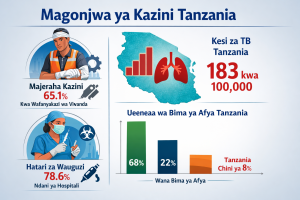
The East African Community Competition Authority Represents a Watershed Trade Moment for the Region’s Underlying Trust and Competition Issues
Awakening the Competition Authority
Recently, I expressed my fears over a long history of mistrust that has slowed the regional integration and formation of a single market for the East African Region. Perhaps the answer lies in the youngest of a dozen other institutions under the EAC, the East African Community Competition Authority (EACCA) which has since taken off after a number of challenges. Established as a show of commitment by EAC partner states to cooperation in trade liberalization and development, including matters of competition, the body can be critical in creating a fair playing ground for business and state actors alike. This represents a watershed moment in the region’s economic landscape, and it underscores the critical role that EACCA is playing in fostering a climate of competitiveness and integration among East African nations.
The Competition Landscape So far

Regional integration is a concept that holds immense promise for the East African region as it seeks to bring nations together by harmonizing policies, fostering trade, and strengthening economic ties. While the EACCA is yet to find a permanent seat within the region, it entered into a Memorandum of Understanding with the Competition Authority of Kenya (CAK) in May 2023 to enhance the execution of the various mandates in supporting regional integration and cross-border trade and investment. The agreement created a framework for mitigating competition infringements with cross-border effects, fostering transparency and predictability, and protecting consumers. This is in addition to a December 2024 deadline for streamlining merger notification guidelines, reviewing complementary regulations and guidelines, and implementing an information-sharing framework on cross-border trade.
Earlier in November, the EACCA signed a second MOU in the region with the Fair Competition Commission (FCC) of Tanzania where the authority reached out to other partner states to advance the competition policy and law to facilitate regional trade. The partnership, which established working groups to advance the competition law outlook in Tanzania will be critical in prohibiting practices that adversely impact free trade in the EAC region, including the restriction or distortion of fair competition. Aligned with the aspiration of the EAC treaty, Customs Union, and the Common Market Protocols, the EACCA is keen on enhancing free trade within the region. This can significantly fix mistrust issues and enhance trade integration and growth within the region.
Cross-border trade is a linchpin of regional integration, and the EACCA has a pivotal role to play in ensuring that it thrives. By signing bilateral agreements with East African nations, such as the MOUs with Tanzania and Kenya, the authority is sending a strong signal that it is committed to creating an environment conducive to cross-border trade.
A Catalyst for Cross-Border Trade
A leading aspiration for the formation of the EACCA is to enhance the competitiveness of Community Enterprises in world markets by exposing them to competition within the community and promoting fair competition. A level playing field is essential for businesses to thrive. The EACCA is entrusted with the task of ensuring that no company, regardless of its origin, enjoys undue advantages or engages in anti-competitive practices. This fosters trust among businesses and partner states, which is crucial for cross-border trade to flourish.
The MoUs signed between Kenya and Tanzania is indicative of an authority keen on enhancing consumer protections to ultimately enhance the welfare of the people within the community. Cross-border trade benefits not only businesses but also consumers. The EACA’s mandate includes protecting consumers from unfair business practices, ensuring they have access to quality products and are not subject to price gouging or exploitation. A thriving cross-border trade environment can lead to a more extensive array of goods and services at competitive prices. This is critical in enhancing a spirit of camaraderie in the community and driving trust in business dealings for enhanced integration.
“The EACA can work in collaboration with national authorities to identify and eliminate these barriers, making it easier for goods and services to flow across borders.”
Articles 76 and 104 of the East African Common Market Protocol establish a framework for creating a single common market, accelerating regional economic growth and development, and introducing the free movement of goods, persons, capital, labor, and services. Considering that divergent regulations and standards across East African countries have stifled cross-border trade, the EACCA provides a mechanism for transitioning effectively on fair and competitive grounds. EACCA’s role in harmonizing these regulations is crucial in reducing the compliance burden on businesses and streamlining the movement of goods and services. Businesses from less competitive or smaller markets can consequently expect a level playing ground in vying for a regional market.
During the signing of the bilateral agreement with Kenya, the EACCA committed to reducing competition that infringes on cross-border trade, reducing transaction costs for businesses, and even addressing issues on information sharing and mergers. Thus, cross-border mergers for business are not only possible to extend market reach but there is also a ready framework to support the transition. Moreover, the impact of Non-tariff barriers, such as red tape, customs delays, and bureaucratic hurdles as obstacles to trade is not lost on the authority. The EACA can work in collaboration with national authorities to identify and eliminate these barriers, making it easier for goods and services to flow across borders.
The authority’s involvement extends beyond regulation; it can also play a pivotal role in building the capacity of national competition agencies to tackle anti-competitive practices effectively. A well-prepared, knowledgeable workforce is a crucial component of ensuring a fair and competitive marketplace in addition to guidance for regional competitive agencies within the country. A region with a well-functioning competition authority is attractive to foreign investors as it provides assurance that businesses will have a fair shot at success, encouraging both domestic and foreign investment.
Moreover, when businesses face competition, they are incentivized to improve their products and services, ultimately benefiting consumers. EACCA’s role in promoting fair competition contributes to a more innovative regional economy. The East African Competition Authority’s efforts to enhance cross-border competitiveness, ensure fair play, protect consumers, and improve the economic outlook of the region are of paramount importance. By signing bilateral agreements with East African nations like Tanzania and Kenya, the authority is taking significant steps toward fostering a climate of competitiveness and integration.
Muoki Musila is an Kenyan based economist. These are the writer’s own opinions and do not necessarily reflect the viewpoints of Liberty Sparks. Do you want to publish in this space? Contact our editors at [email protected] for further clarification.



